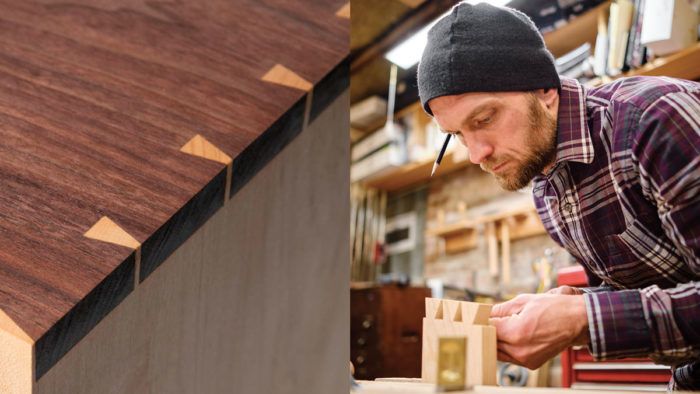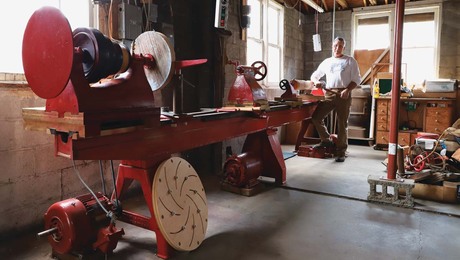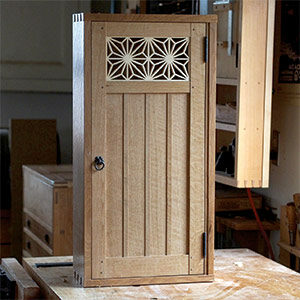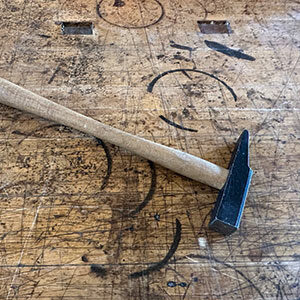From The Bench: The tortured cycle of a woodworking project
Adam Godet explores the mental side of woodworking, from the initial dreams of perfection to the final, flawed (but actually very good) result.
Synopsis: We have a lot of experience in writing about the technical side of woodworking: all the steps, processes, and skills needed to create a piece of furniture. Here’s a look at the mental side, from the initial dreams of perfection to the final, flawed (but actually very good) result.
Every woodworking project is different, but there are elements of each that are the same—both technically and mentally. This magazine typically focuses on the technical side; here’s a look at the mental side.
Before you start a project, there is concentrated excitement. You haven’t even bought the wood yet; you’re designing, planning, researching. Mistakes at this point can be fixed with a delete key or pencil eraser. You can work late at night, early in the morning, or even while in a meeting at work (if you’re discreet). There’s no dust mask, earmuffs, or safety glasses. It is unmitigated excitement and joy for many of us. The project is going to come out perfectly. You think: This will be the manifestation of a Platonic form.
Next, you get your lumber. This is not that stressful; you know what you’re doing. You take your time and select the best boards for your project. You think: This project is going to be on the cover of Fine Woodworking.
Back home, you start milling the wood you just bought. Wait, WHAT!? There’s an 8-in.-long crack in that board? How did you miss that? Oh shoot, how did you get so much tearout? OK … you’ll reconfigure a few things from your original plans, use that “just-in-case” board you bought, and run everything through the planer a few more times. You think: Platonic form it may not be, but this project is going to be really good.
Next, you lay out the joinery and start making sawdust. This is the day you’ve been waiting for. You’re a craftsperson, like Sam Maloof, Tage Frid, and your other heroes. Your dovetails make actual doves jealous. This is going to be … Shoot! How did you bust through that baseline? You think: Everyone patches a few dovetails; the joint will be plenty strong.
All your joinery is cut and you’re still feeling pretty good. Yeah, Krenov might not have signed his name to this piece, but you’re still learning. It’s going to be good. You have the rest of your life to build the Platonic form of this piece. Your spouse/client is going to love it. Today, you need to focus because it’s glue-up day. The temperature and humidity are on your side. You have your cauls; you’re focused—let’s do this!
The glue-up went fine. You oriented everything perfectly, the clamps are on, you cleaned up the squeeze-out, but now you’re in a mental tailspin. The overall form is obscured by the clamps; the wood is discolored by the squeeze-out and its cleanup; true, those are temporary, but things don’t look right. You can clearly see some gaps in your joints. You’re second guessing your overall design—the relative dimensions seem off to you, are your joinery choices the right ones? You think: What would Mike Pekovich say if he saw this? Oh, the horror. Why did you ever call yourself a woodworker?
You go to bed, cold and alone.
The next day, you head to the shop, determined to either cut the piece into burnable chunks, or complete it as an act of self-flagellation. But as you remove the clamps, it doesn’t look as bad as you remember. The gaps you saw yesterday somehow seem smaller. You imagine the finished color of the wood. You think: This thing’s not half bad. It’s gonna be OK.
You finish the piece. You’ve stopped comparing yourself to Krenov, Maloof, and Frid and started appreciating the piece for what it is. It is not as perfect as you imagined, but it’s good. Everyone who sees it, loves it. You even post photos of it on social media. Then company comes by and admires your work. You point out every single flaw.
You start on your next sketch. You think: This is going to be the manifestation of a Platonic form …
Adam Godet makes furniture in Washington, D.C.
From Fine Woodworking #285






















Comments
LOL...Isn't it funny in life that we can aspire to such great heights and then see our imperfection on display. Really appreciate this article. There have been many nights, I've woken up thinking about a particular hurdle I need to overcome. You've captured the essence of it....It's never as bad as you thought. Most people won't notice. Finished is better than perfect. And you misspelled woodworking in the title and it is still an excellent article.
...a classic description of the process, and you must have done better in English class than I did.
Holy cow! I could've sworn this article was a description of my wood working daily experience(s). I'm not alone. Thanks!
I laughed because I cried as all of these things have happened to me. Lonnie Bird told me at a class “the difference between a pro and you is, a pro does not point out his mistakes.” Thus I no longer point out my mistakes and tell myself I am indeed a pro.
A very wise person once said to me "seek excellence, not perfection". That was a few decades ago, when I was in my twenties, and it was the most freeing thing anyone ever said to me. The problem we have as adults is that we expect perfection and professional results from the very outset, even in things we have never done before. Kids don't do that. Kids know there is a learning curve. They are proud of each iteration of everything they create and rightly so. Look with fondness on your early pieces. They were the start of a beautiful journey, not an embarrassment to be shunned.
OMG Yes. That's it exactly. I thought I was the only one.
So true. I can point out the flaws in every piece I have ever built in my 50+ years of building. BUT! I learned a long time ago, not to point them out to anyone else. It's always a bit amazing (and humbling) to me that people I show/give my work to think it's the most incredible thing they've ever seen. Even something as simple as a pen.
I've learned to be proud of my work - and my mistakes!
Log in or create an account to post a comment.
Sign up Log in